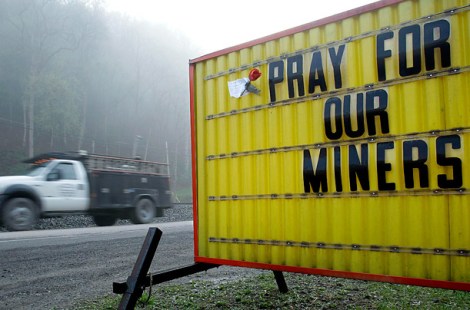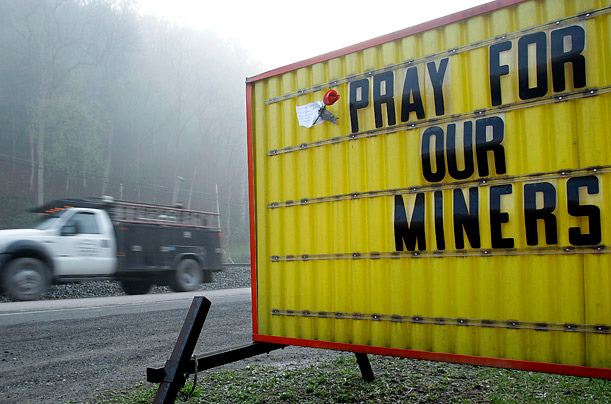A former superintendent at Massey Energy’s Upper Big Branch Mine pled guilty today to his role in the 2010 explosion that killed 29 miners. From NPR:
[F]ormer Upper Big Branch coal mine superintendant Gary May was sentenced to 21 months in prison and ordered to pay a $20,000 fine. …
May pleaded guilty to one count of conspiracy and admitted to ordering a company electrician to disable a methane monitor on a mining machine so it could continue to cut coal without automatic shutdowns. The monitor is a safety device that senses explosive amounts of methane gas and automatically shuts down mining machines when dangerous levels of gas are present. …
May also pleaded guilty to deceiving federal mine safety inspectors and hiding safety violations.

TV 19A sign near the Upper Big Branch mine in 2010.
Last November, another Massey executive, David Craig Hughart, pled guilty to conspiracy. At the time, we speculated that his co-conspirators might include former Massey CEO Don Blankenship; now we know that the conspiracy at least included May.
What May did — basically the equivalent of shutting off a home carbon monoxide detector that kept sounding its alarm — is reprehensible. There is some belated recognition that it should also have been preventable. Shortly after the announcement of May’s plea deal, the Mine Safety and Health Administration announced a new rule that could prevent similar situations in the future.
MSHA calls it the “pattern of violations” rule and it’s supposed to identify coal mines with serious, persistent and habitual safety violations and then target them for heightened scrutiny. But MSHA failed to enforce the rule in the first 33 years of its existence, in part because of a self-imposed and cumbersome regulatory step. …
Investigators concluded that the Upper Big Branch mine qualified for preliminary “pattern of violations” (POV) status before the April, 2010, explosion. But regulators failed to apply the rule, blaming a “computer glitch” that has never fully been explained.
The revised rule eliminates preliminary steps so that regulators will have a much easier time citing and sanctioning habitual violators of serious safety standards. The new rule also triggers automatic and immediate shutdowns of mining areas if serious and substantial violations are found in mines with POV status.
Unsurprisingly, those mining industry executives who have not pled guilty to conspiracy charges spoke out against the tightened rule. From The Hill:
The National Mining Association (NMA) panned the rule, saying MSHA ignored the group’s concerns about the rule. Among them is the loss of mine operators’ due process when responding to a violation notice.
“Because any unsafe conditions must be remedied under current regulations, no miner is put in harm’s way if a citation is appealed,” the NMA said in a written statement. “As such, the loss of due process rights serves no safety objective.”
The group said some operators would unjustifiably be found in a pattern of violation, with little recourse.
It could be worse.



